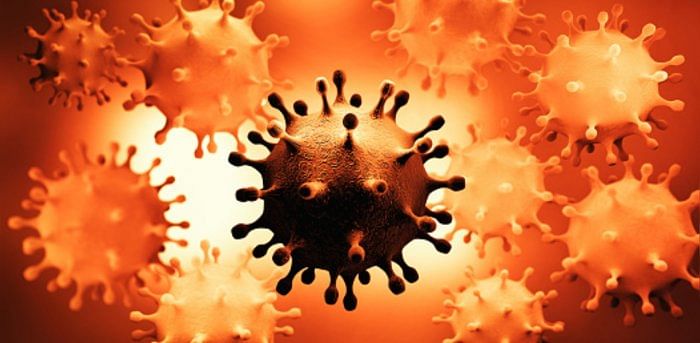
Researchers from Nitte (Deemed to be University) have reported the identification of a novel mutation in the genome of SARS CoV-2 -- the virus that causes Covid-19.
The findings, to be published in the forthcoming paper in the prestigious Elsevier Journal Virus Research by Nitte researchers, will have important bearings on the virus detection and disease severity.
According to the researchers, this mutation affects E-gene encoding the envelope protein, which is very important for the structural organization of the virus.
Due to the importance of this protein for the structure of the virus, the E-gene is the target for detection of virus in clinical samples by the commonly used RT-PCR in clinical samples.
Normally, RT-PCR for Covid-19 diagnosis involves two steps, screening test involving detection of E-gene, and if this is positive, confirmatory test involving detection of RdRp gene encoding enzyme, involved in viral replication or N gene encoding a nucleocapsid protein.
Dr Anusha Rohit from a tertiary care hospital in Madras Medical Mission, alerted Nitte researchers about observation in some laboratories that occasional samples may be negative for E-gene but positive for RdRp gene or N gene, depending on the confirmatory test system used in these laboratories.
Since most laboratories do screening and confirmatory tests one after the other, samples negative for E-gene will not be processed for confirmatory test and reported negative.
Researchers from Nitte University Center for Science Education and Research (NUCSER), Dr B Krishna Kumar, Prithvisagar and Praveen Rai, under the mentorship of Dr (Mrs) Indrani Karunasagar and Dr Iddya Karunasagar, scanned the nucleaotide sequence of E-gene of over 2,000 viral genome sequences from India, available at the database of Global Initiative on Sharing All Influenza Data (GISAID).
Partial deletion in one of the ends of this gene, which is termed the ‘carboxy terminal’ was found in 34 viral genomes.
These were spread across different states in India – Karnataka, Maharashtra, Delhi, Madhya Pradesh and Odisha. The deletions in all states, except Odisha, were such that the RT-PCR detection of the virus would not be affected. But in 8 genomes from Odisha, the deletion was large enough to render RT-PCR reaction negative.
Though this is a very small proportion (8 out of 2,086) in the sample studied, this will work out to 32,500 genomes with large deletions in 8.4 million cases detected in India, which would be very significant.
The deletion in C-terminal region of E-gene in viruses from Karnataka, Maharashtra, Madhya Pradesh, New Delhi and Odisha, would effect the virus assembly, and it is likely that these viruses would have lower virulence.
Data on disease severity of individuals, from whom these genomes were obtained, was not available, except in six individuals, who had asymptomatic infection.